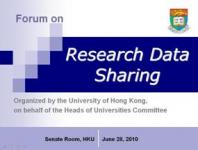
Forum on Research Data Sharing

Organised by the University of Hong Kong, on behalf of the Heads of Universities Committee (HUCOM)
Senate Room, June 28, 2010
- Programmme Rundown
- Photo Gallery
-
Presentations in PowerPoint:
by Professor Edward Seidel, Assistant Director, Directorate for Mathematical and Physical Sciences, National Science Foundation, US
by Professor Denise Lievesley, Head, School of Social Science and Public Policy, King's College London, UK
by Professor John Bacon-Shone, Associate Director, Knowledge Exchange Office, The University of Hong Kong
Issues surrounding the sharing of research data have become pertinent to research communities across the world, given the growing amount and complexity of research data, the increasingly interdisciplinary and international nature of research teams, and the need for public accountability.
A forum on 28 June 2010 at The University of Hong Kong (HKU), held on behalf of HUCOM, brought together representatives from Hong Kong’s universities, the Hong Kong Government Census and Statistics Department, and research funding bodies, including Professor Roland Chin in his capacity as Chair of the Research Grants Council, to consider the way forward for research data sharing in the Hong Kong context.
Through video conferencing, Professor Edward Seidel—Assistant Director, Mathematical and Physical Sciences, National Science Foundation (NSF), USA—gave an insight into good international practice for sharing science data by outlining the NSF’s own experience.
Profound transformations since the early 1970s in how science is conducted have meant dramatic and accelerating increases in the amount of research data. “Modern science is data- and compute-intensive, integrative, and involves multi-scale collaborations for complexity,” Professor Seidel said. New approaches are needed to support the large amounts of complex data and the integrative and multi-scale nature of research, he said.
NSF is responding to this major shift in science towards data-intensive methods. In principle, publicly funded data should be made available, data needs to be stored and accessible, and an affordable and sustainable plan is needed for maintaining data sets. However, there are many complexities in developing policy, and many practical issues and concerns must be addressed, including the challenge that “one size doesn’t fit all’.
Later this year, NSF will introduce the requirement for investigators to submit a data management plan with each funding proposal. This will be subject to peer review and customised by discipline, as appropriate.
A UK and Humanities and Social Sciences perspective was provided by Professor Denise Lievesley, Head of the School of Social Science and Public Policy, King’s College London and Chair of the European Statistical Advisory Committee.
The UK has maintained a data archive in these disciplines for over 40 years, with data sharing generally seen as the norm. This fits with the scientific principle that research findings together with the dataresults, Professor Lievesley said. Such archiving and access can help realise the full potential of collected data, and secondary analysis can play an important role in avoiding unnecessary duplication.
Professor Lievesley stressed the importance of establishing policy on data access, sharing and preservation, using both incentives and requirements to ensure implementation. Policies also need to address the responsibilities of the data users, ensuring they acknowledge and give credit to the data collectors, respect conditions of access, use data responsibly, and provide feedback on use.
Professor Lievesley outlined a wide range of benefits of data sharing to individual researchers and research groups, universities, funding bodies, and society. “Research data grow in value the more they are used,” she said, “unlike most commodities which are diminished withuse.”
For sharing research data in Hong Kong, Professor John Bacon-Shone (Associate Director, Knowledge Exchange, HKU) put forward a number of questions to the forum participants: Why share? What and how to share? Who to share with? What to use as the starting point? He suggested that RGC-funded research projects could be the initial focus, and raised a wide range of issues including timing of sharing, acknowledgement, confidentiality, intellectual property, access, archiving requirements, disciplinary differences, and funding.
Discussion followed on points raised in the three presentations. The discussion was summed up by Professor Paul Tam, Pro-Vice-Chancellor and Vice-President (Research) at HKU, who proposed a series of stages that could move the issue forward, involving the local institutions working together to agree a model for the Hong Kong context informed by successful overseas models.


